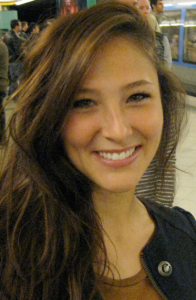 When Gina D’Alesandro ’11 graduated from Loyola Marymount University with a degree in Urban Studies, her global education was just beginning. Her passion for environmental sustainability led her to join the Peace Corps for a 3-year term in Zambia, where she helped implement climate-smart agricultural solutions. D’Alesandro is now studying environmental science, policy, and management in a masters program at Central European University in Budapest, Hungary. She recently sat down with BCLA Communications Intern Sal Latif ’16 to talk climate change.
When Gina D’Alesandro ’11 graduated from Loyola Marymount University with a degree in Urban Studies, her global education was just beginning. Her passion for environmental sustainability led her to join the Peace Corps for a 3-year term in Zambia, where she helped implement climate-smart agricultural solutions. D’Alesandro is now studying environmental science, policy, and management in a masters program at Central European University in Budapest, Hungary. She recently sat down with BCLA Communications Intern Sal Latif ’16 to talk climate change.
Q. Tell us about your three years in the Peace Corps.
A. In the technology-light world of rural Africa, I lived and worked directly on those issues I studied in university and read about. Climate change in rural Africa is a salient topic to the rural subsistence farmers of Zambia. I was ready to work with people just as concerned and devoted to the issue as I was.
It was the most hands-on the experience gets— I was no longer just reading about it, studying models of what could, potentially, maybe, we-actually-have-no-idea, happen. I was out there seeing for myself what was changing about the climate and hearing from real people, experts on the topic no less, how it was affecting ecosystems and human life. I had almost complete freedom to assess the situation on the ground, create my work out of what I saw, configure my own approaches to climate and environmental solutions, and try out ideas directly in the field.
My favorite part was having my perspective completely and radically reoriented. The creativity that you experience when you live wholly within a new culture was exciting and invigorating, on a daily basis.
Q. How did your LMU experience prepare you for the work you did in Zambia?
A. My volunteer work with LMU in the Los Angeles community engaged me with issues of environmental inequality and made clear some of the pitfalls of modern consumptive lifestyles in the developed world. I got a balanced perspective of the issues from my urban studies courses, examining issues from different disciplines. I took to heart the messages of Jesuit education that encouraged me to open my mind to see solutions that included the wider community via the diverse, constantly evolving culture of Los Angeles all around me.
Q. What are you studying in graduate school and what is it preparing you to do next?
A. I am studying the ramifications of climate change in the natural world – for ecosystems, to human health. [I am] also examining the social dimension concerned with the management of a future within a changing climate and the policing of bodies to adhere to climate-aware alternatives. I study with people from around the world in an international setting, and I am learning how the debates are shaped within this discipline, both within and from that international perspective. Following the completion of my master’s degree I will either continue on to my Ph.D or I will work internationally in some capacity on climate change.
Q. Why did you decide to start working in the environmental sustainability field?
A. I started working in environmental sustainability as the natural consequence of a childhood spent outside interested in nature. I grew up in Salt Lake City where we have many canyons and mountains within 30 minutes of almost anywhere in the valley. I had ample opportunity to explore and play in the natural world growing up. That interest and inquisitiveness I developed about nature as a child has continued to be a guiding force in determining my career path as an adult.
Q. How can LMU students engage in more environmentally sustainable practices?
A. Consume less. It doesn’t have to mean a decreased standard of living—look at the Europeans, they have a very similar standard of living but consume radically less and in higher densities than Americans generally do. We have been trained to consume, consume consume, but thinking about what this means and taking the time to reassess our relationship with what we ‘need’ and what we actually need could be a beneficial exercise in mitigating further environmental degradation and saving us from the worst environmental effects down the road.



